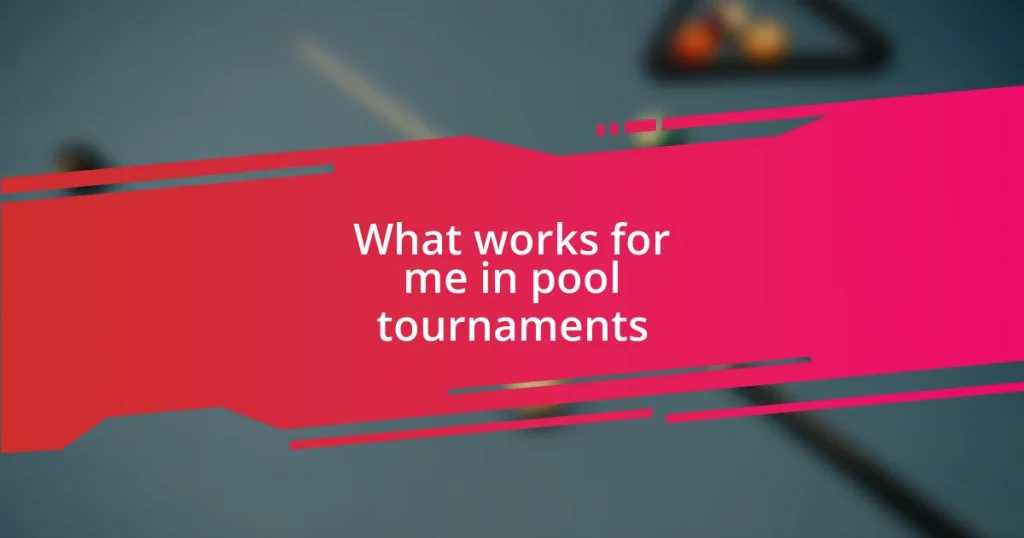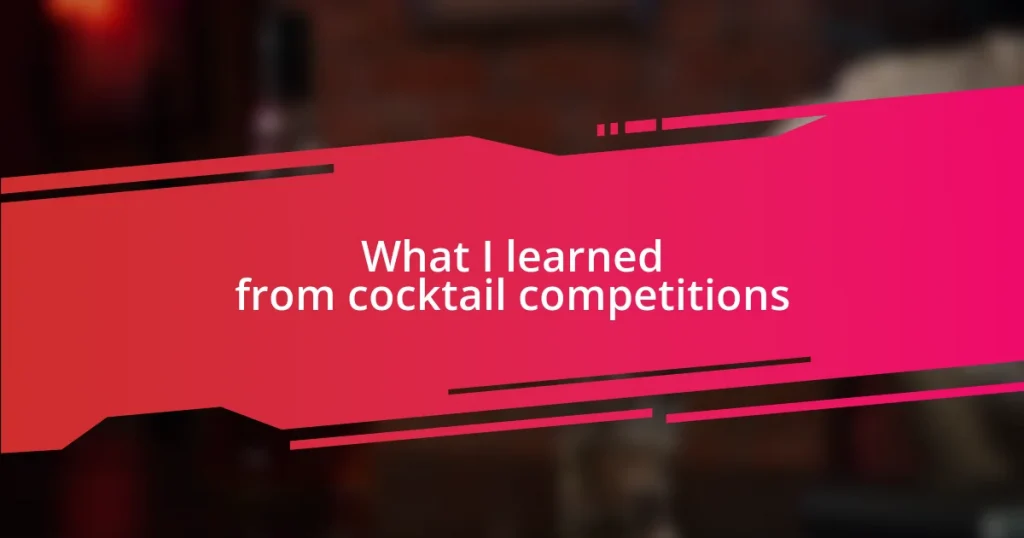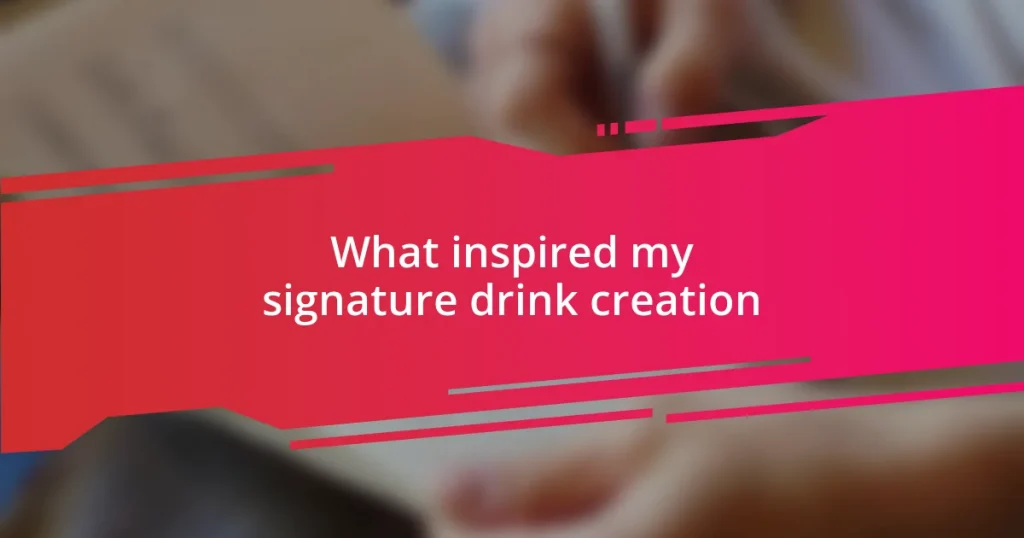Key takeaways:
- Understanding tournament formats influences player strategy and emotional experience, affecting how matches are approached and enjoyed.
- Consistent practice routines, along with proper nutrition and mental visualization, are essential for building confidence and readiness before competitions.
- Analyzing opponents’ strategies and reflecting on past experiences can enhance performance, helping players learn from mistakes and adapt during matches.
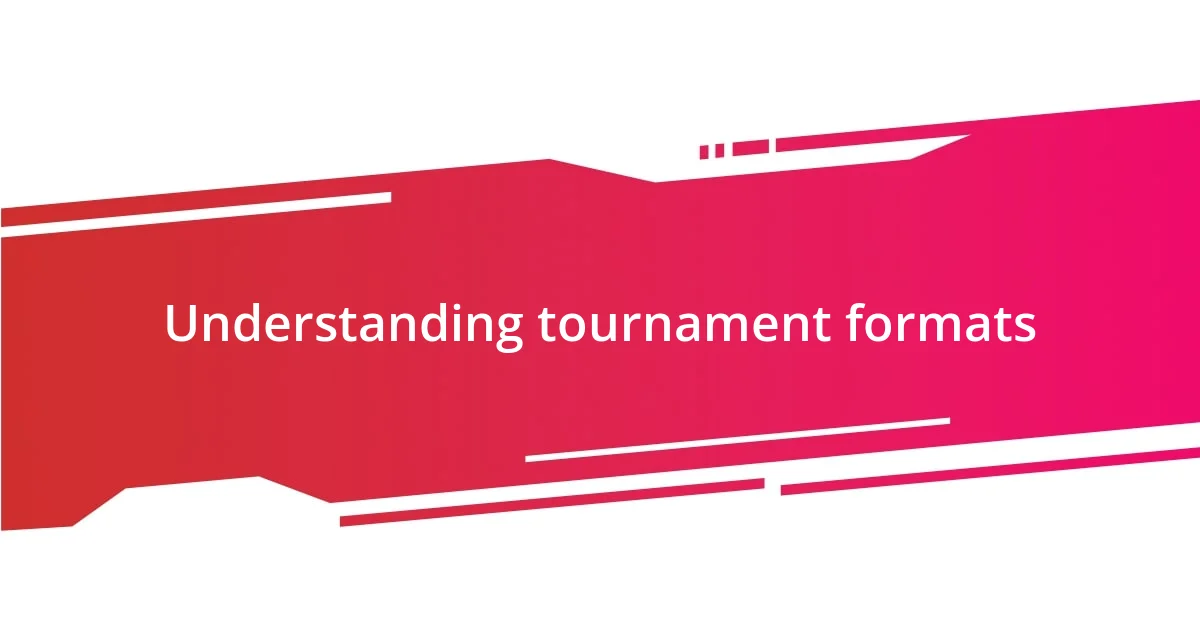
Understanding tournament formats
Understanding tournament formats is crucial for any player looking to succeed in pool. I remember my first experience in a double-elimination tournament; it was overwhelming at first. The realization that I could lose a match and still have a chance to fight my way back was both exciting and nerve-wracking.
Different formats can significantly shape the player experience. For instance, in round-robin tournaments, I found myself developing friendships with opponents, as we often played several matches against each other. Interacting like that added a layer of enjoyment that I didn’t expect, making the competition feel more about camaraderie than just winning.
Have you ever thought about how the format can affect your strategy? I’ve learned that in single-elimination tournaments, the pressure mounts with each match, requiring sharper focus and a strategic mindset. Adjusting my game plan depending on whether I had one chance or multiple chances kept me on my toes and made every match an adrenaline rush.
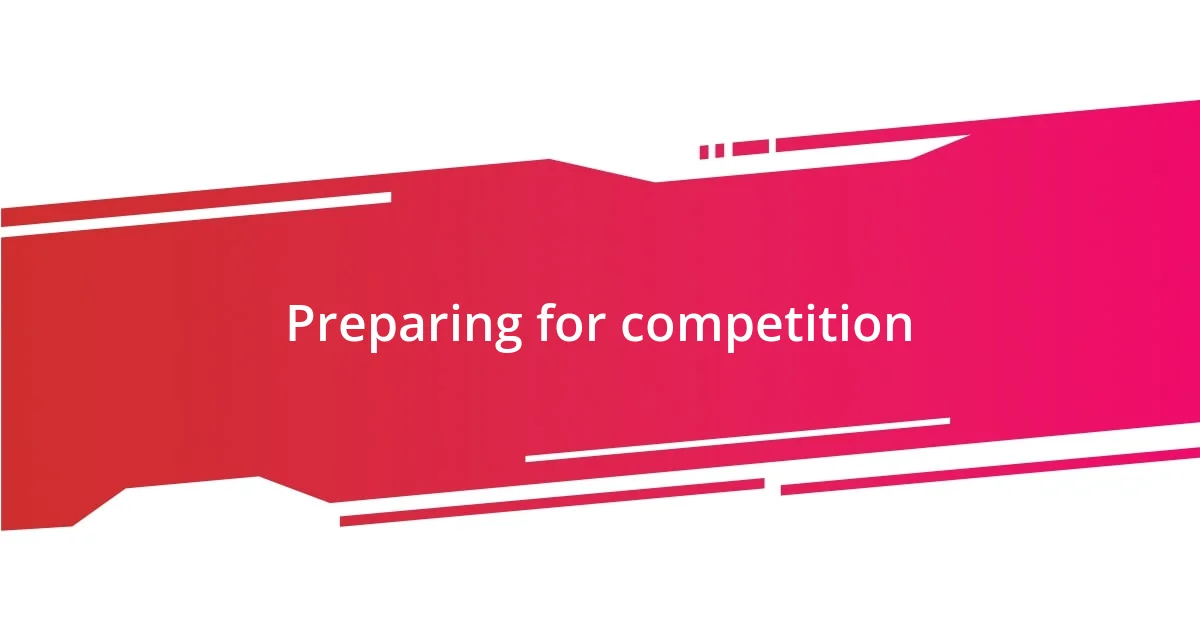
Preparing for competition
Preparing for competition is all about the mindset and the routines that lead up to tournament day. Personally, I find that practicing consistently in the weeks before a tournament not only hones my skills but also builds my confidence. One specific routine I follow is setting aside time for both solo practice and match simulations with friends, ensuring I’m mentally prepared for high-stakes situations.
On the day of the competition, I prioritize my physical and mental well-being. I remember one time I neglected to eat properly before a tournament and ended up feeling sluggish, which affected my performance. Now, I make it a point to have a nutritious meal, stay hydrated, and even do some light stretching to keep my body and mind sharp. This preparation sets a positive tone for my gameplay.
Lastly, I believe visualization plays a huge role in my success. Before each tournament, I take a moment to visualize my matches, imagining every shot and my reactions to various scenarios. This practice not only calms my nerves but also helps me create a game plan in my mind, making me feel grounded and ready when I step to the table.
| Preparation Aspects | Personal Approach |
|---|---|
| Practice Routine | Consistent solo practice and match simulations |
| Nutrition | Balanced meal and hydration before competition |
| Mental Visualization | Imagining matches and scenarios for confidence |
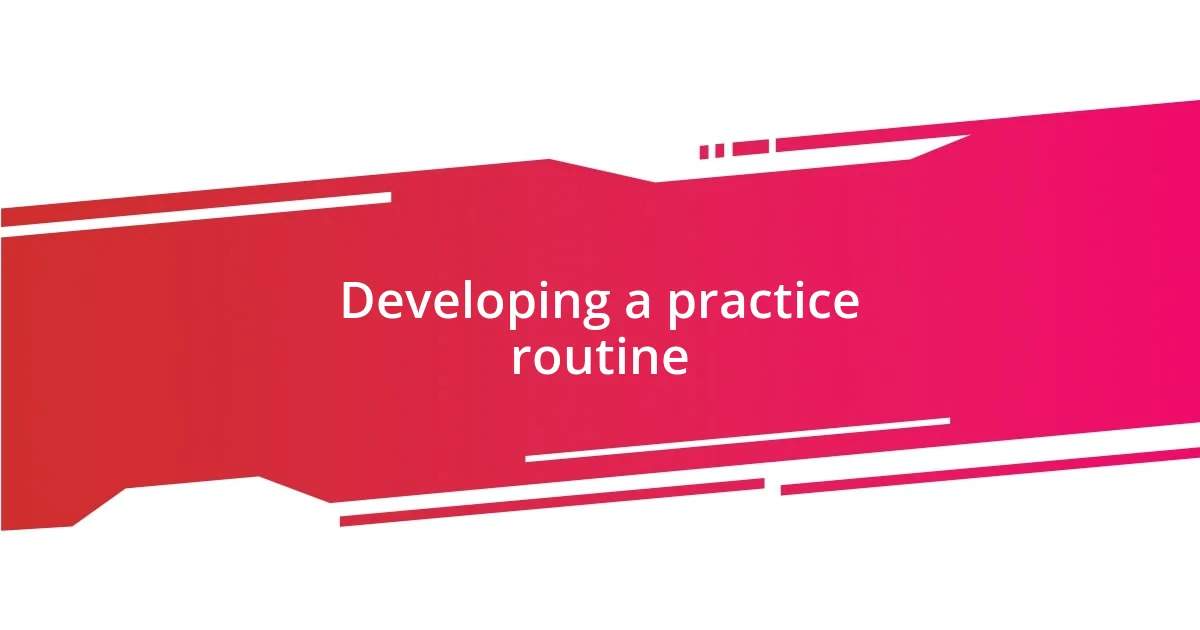
Developing a practice routine
Developing a practice routine
Creating a solid practice routine has been a game changer for me in pool tournaments. At first, I would jump into practice haphazardly, but over time, structuring my sessions transformed my gameplay. I discovered that mixing different types of drills—like stroke mechanics, challenging shot scenarios, and even mental exercises—made my practice feel well-rounded and effective.
To help streamline your practice sessions, I recommend keeping a balance between technique and game strategy. Here’s how I approach it:
- Warm-Up: Start with a few basic shots to get comfortable.
- Targeted Drills: Focus on one aspect of your game (like break shots or banking).
- Match Simulation: Play against someone or set up scenarios that mimic tournament pressure.
- Analysis Time: After practice, review what worked and what didn’t.
- Cool Down: Finish off with some easy shots and reflect on the day.
These steps not only keep me focused but also allow me to track my progress, which is incredibly motivating. I vividly recall one practice session where I struggled with my break shot. By isolating it as my main focus for the week, I saw noticeable improvement, and that boost in confidence carried me through my next tournament. The transformation I experienced just from this structured approach was exhilarating, making each session not only productive but also enjoyable.
I can’t emphasize enough how practice routines can help alleviate nerves. Having a well-planned structure in place gives me a sense of control, especially before a big tournament. Once, during a particularly high-stakes game, I relied on my practice routine, which allowed me to zone in and perform under pressure, despite the stakes. The familiarity of my drills and mental exercises created a comforting backdrop amidst the chaos of competition.
Consider integrating the following elements into your routine to enhance focus and technique:
- Consistent Scheduling: Practice at the same times each week to develop a rhythm.
- Warm-up Routines: Use stretches or light exercises to prepare both your mind and body.
- Feedback Sessions: Record practice games and watch them to catch mistakes and improve your strategies.
- Mindfulness Techniques: Incorporate breathing exercises or meditation to enhance focus.
With a clear-cut routine, I’ve not only grown as a player but also found enjoyment in the process. Building this level of familiarity has made it easier to approach tournaments with confidence instead of anxiety.
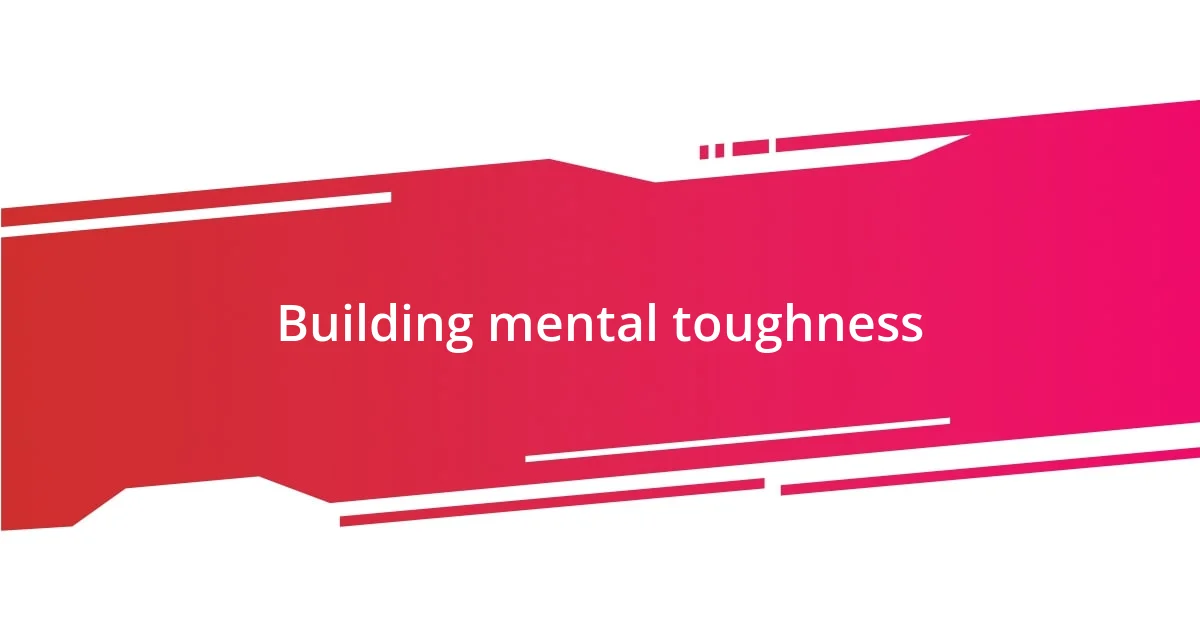
Building mental toughness
Building mental toughness is essential for thriving in pool tournaments. I remember a time when I faced an exceptionally skilled opponent. Instead of succumbing to anxiety, I redirected my focus inward, reminding myself of my preparations. This mindset shift turned my nerves into excitement, fueling my game rather than hindering it. Have you ever felt that adrenaline surge when you transform pressure into motivation? It’s a powerful experience.
Another strategy I rely on is embracing failure. In one tournament, I missed a critical shot that cost me the match. At first, it stung, but I chose to analyze what went wrong instead of dwelling on it. That incident became a stepping stone for me. I learned to view every setback as an opportunity to grow stronger mentally. I often ask myself: how can I turn my mistakes into lessons? This mentality has helped me become more resilient.
I find that positive affirmations also play a crucial role in my mental game. Before entering a tournament, I take a moment to remind myself of my skills and why I compete in the first place. Telling myself, “I am prepared, I can handle this,” reinforces my confidence. This practice has the potential to quiet self-doubt. Have you ever noticed how a simple shift in self-talk can change your outlook? It’s these small mental habits that build a robust foundation for success.
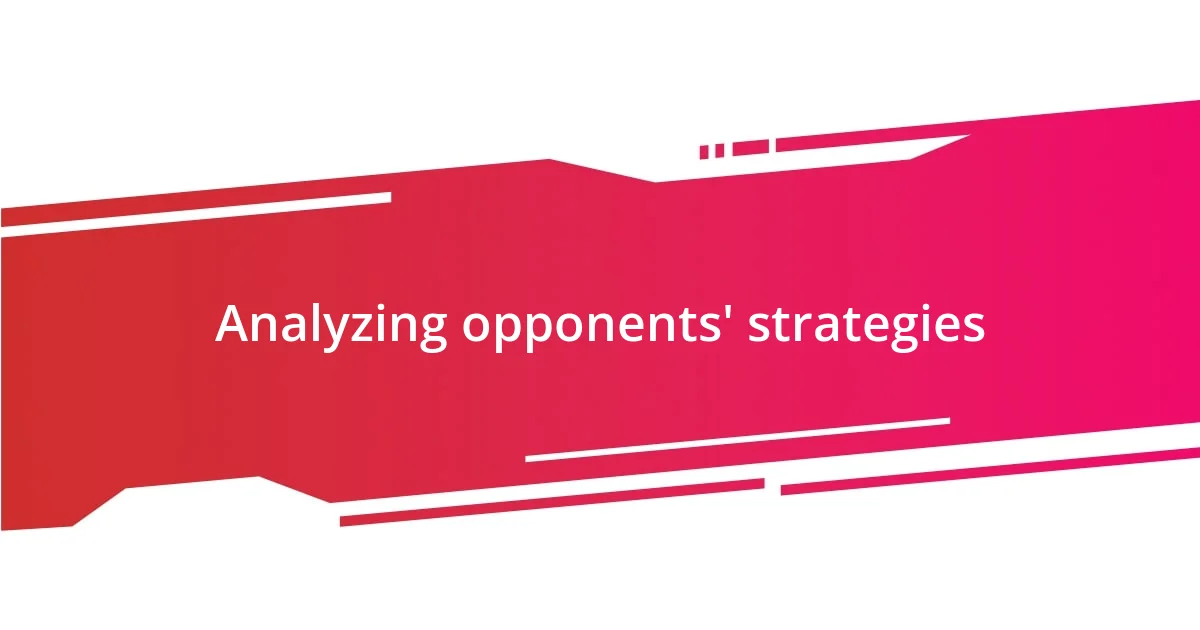
Analyzing opponents’ strategies
Analyzing opponents’ strategies is a critical component of success in pool tournaments. I recall a match where my opponent relied heavily on defensive play, trying to force me into mistakes. Instead of responding impulsively, I paused to assess his tendencies. This allowed me to anticipate his next moves, and ultimately, I was able to turn his strategy against him. Understanding my opponent wasn’t just about reading their shots; it was about predicting their mindset. Have you ever found yourself in a game where you felt you were one step ahead just by observing?
One of the tactics I’ve found helpful is to recognize patterns over multiple frames. For example, if an opponent consistently opts for a particular type of shot, I exploit that to create opportunities for myself. I had a situation where an adversary leaned on risky long shots, but by observing his success rate, I adjusted my position to counter those plays. This shift not only put him on the defensive but also boosted my confidence. How often do you take a moment to reflect on your opponent’s patterns during a game?
Emotional insight plays a role too—reading not just the cue ball, but the cues they give off. Body language can tell you if they’re feeling nervous or confident. I remember one intense match where my opponent’s eyes darted around the table anxiously; that was my clue to maintain aggressive play. When you become attuned to these subtle signals, it can shift the tide of the match in your favor. Have you ever noticed how much an opponent’s demeanor can affect your strategy?
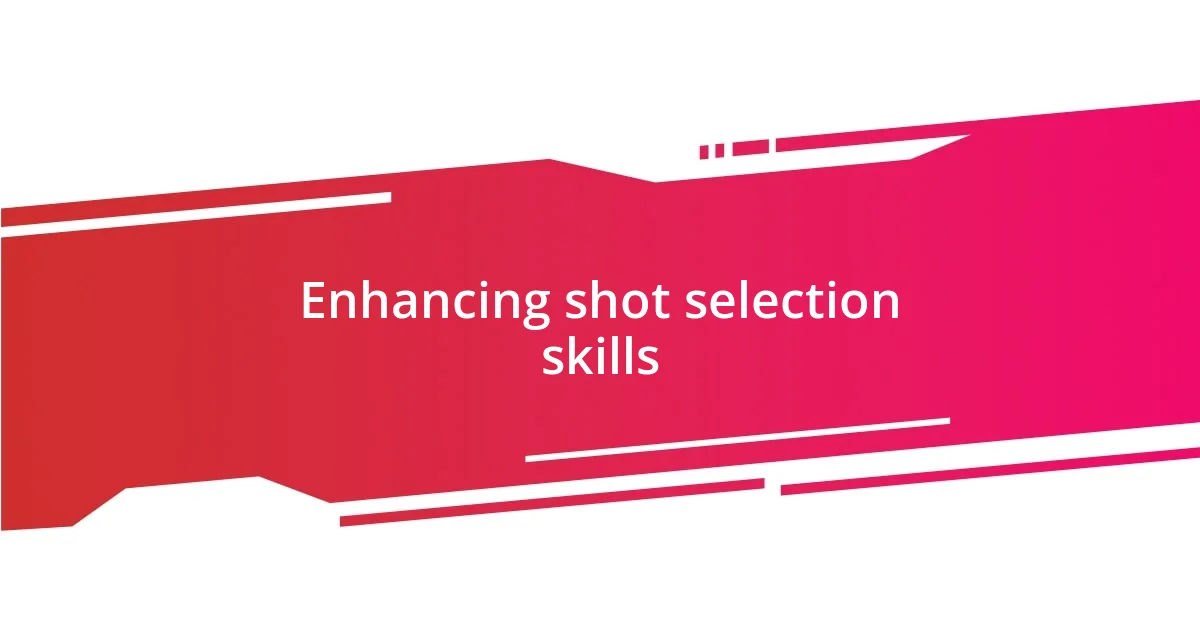
Enhancing shot selection skills
Developing shot selection skills is vital for success in pool tournaments. One approach I’ve adopted is mentally visualizing each potential shot before I execute it. Before I actually pull the trigger, I picture the angles and possible outcomes. This mental rehearsal not only calms my nerves but also helps me commit to the shot I select. Have you ever paused to visualize a shot, and felt a sense of clarity as you moved into action?
Another practical tip I’ve found helpful is considering the layout of the table. I often take a moment to reflect on the positioning of the balls, assessing both high-percentage shots and strategic opportunities. For instance, there was a time when I was faced with a difficult shot, but I noticed an opportunity to play safe instead. By focusing on the table’s dynamics and my opponent’s position, I made a calculated decision that shifted the momentum of the game in my favor. How often do you take a step back to examine the bigger picture during your matches?
Lastly, I’ve discovered that asking for feedback from trusted fellow players can enhance my shot selection skills. After a particularly challenging tournament, I sat down with a friend to review critical moments in my matches. Their insights helped me identify tendencies I hadn’t noticed in my own play. This collaborative reflection deepened my understanding of strategy and led to more informed choices in future tournaments. Have you ever found that discussing your game with others opens your eyes to new perspectives?

Learning from past experiences
Reflecting on past experiences has consistently shaped my approach in pool tournaments. I remember a time when I didn’t trust my gut during a critical match. Instead of taking the shot I felt confident about, I hesitated and opted for a safer option. The regret lingered because I realized afterward that the risk I avoided might have shifted the game in my favor. Have you ever replayed a moment in your mind, wishing you’d chosen differently?
In another tournament, I faced a challenging opponent who had previously defeated me. I studied our past match, honing in on moments where I could have capitalized on his weaknesses. When we played again, I was prepared, having learned from my previous mistakes. This gave me a confidence boost. It’s fascinating how analyzing setbacks can flip the script in a future encounter. How do you ensure past losses become stepping stones rather than stumbling blocks?
One of the most powerful lessons I’ve learned is the importance of emotional fortitude. After a particularly rough game where my frustration took over, I vowed to channel my emotions positively the next time. During my next match, when my opponent sunk an unexpected shot, I stayed calm and focused, allowing me to regain control. It’s incredible how mastering one’s emotions can directly impact performance. Have you experienced the difference that emotional awareness can make during high-pressure situations?










